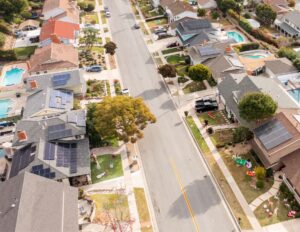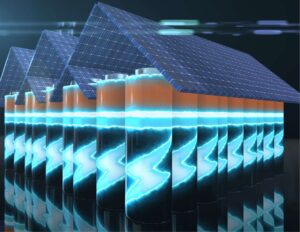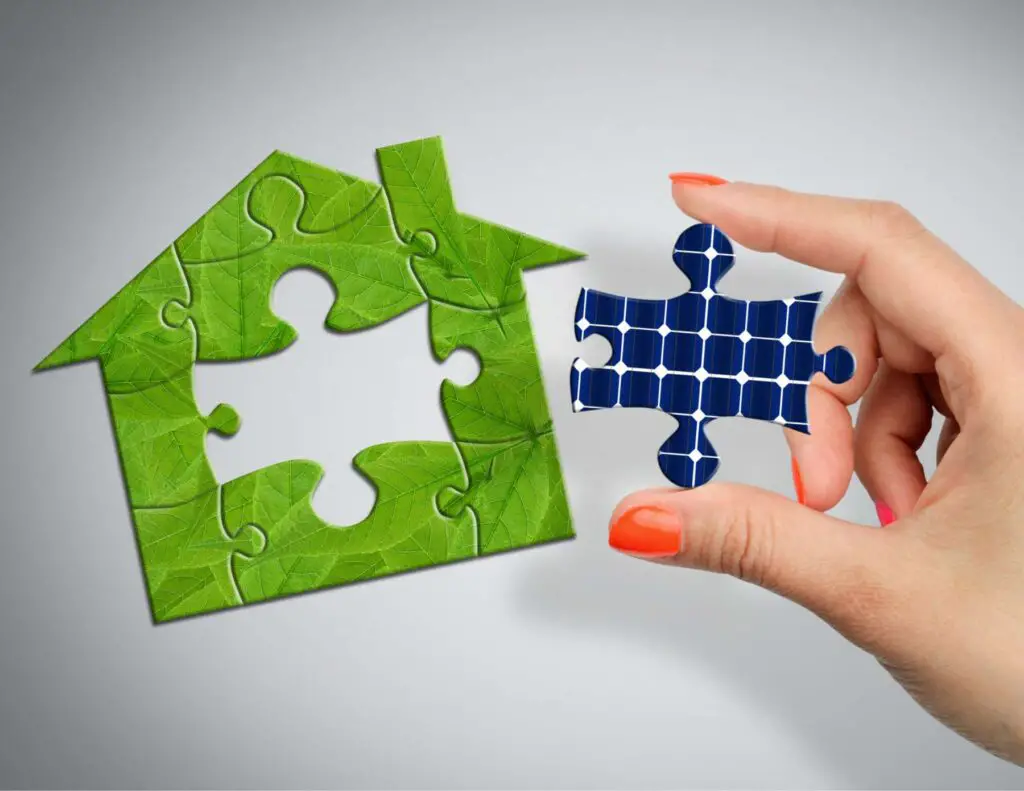Solar panels have become increasingly popular in recent years as a source of renewable energy. They are a sustainable and cost-effective way to generate electricity, and can significantly reduce a household’s carbon footprint.
One of the lesser-known benefits of solar panels is their ability to provide power during a blackout or power outages. During an outage, many households are left without electricity for hours or even days. This can be particularly challenging during extreme weather events or emergencies, when access to power is critical.
This article will help shed some light on the why and how solar panels can be a life-saver when city power goes out. People that are looking to live off the grid will also find some of these insights handy. So, buckle up, this article is a doozy!

Will Solar Panels Work During Power Outages?
Solar panels alone will not work during a power outage because grid-tied solar panel systems are designed to shut down as a safety precaution. However, by integrating solar battery systems, you can store energy and use it during blackouts.
Solar battery systems are the key to enabling solar panels to work during power outages and provide a reliable backup power source for your essential appliances and devices.
For uninterrupted power supply during power outages, solar battery systems are the key. By incorporating solar battery storage into your solar panel system, you can store excess energy produced during the day and use it when the grid is down.
Solar battery systems allow you to tap into the stored energy and continue powering your essential appliances and devices, even during a blackout. With a battery-backed solar system, you can achieve energy independence and greater resilience, knowing that you have backup power available when you need it most.
In addition to providing electricity during power outages, solar battery systems offer other advantages:
By storing excess energy, you can reduce your reliance on the grid and lower your electricity costs. During times when electricity rates are high, such as peak demand periods, you can use the stored energy from your solar battery instead of drawing power from the grid, effectively reducing your energy expenses.
Solar batteries also allow you to maximize self-consumption of the energy your solar panels generate, increasing your overall energy efficiency and sustainability.
Off-grid solar systems, which are not connected to the utility grid, can provide electricity during power outages. Off-grid systems are designed to operate independently, relying solely on solar panels and batteries to meet your energy needs.
However, these systems require careful planning, sizing, and management to ensure they can provide sufficient power for your household’s requirements during extended periods without sunlight.
If you’re considering installing solar panels and want to ensure uninterrupted power during outages, it’s recommended to consult with a reputable solar installer. They can assess your energy needs, evaluate the feasibility of incorporating battery storage, and design a system that meets your specific requirements.
Why Solar Panels Are Essential During Power Outages
During power outages, solar panels can be a lifesaver for homeowners. In the event of a natural disaster or any other emergency that leads to a power outage, solar panels can provide a reliable source of electricity. With solar panels, homeowners can continue to power essential appliances and devices, such as lights, refrigerators, and medical equipment, without relying on the grid.
How Solar Panels Work During Power Outages
During the day, solar panels generate electricity from the sun’s rays, which is then stored in batteries for later use. When a power outage occurs, the solar panels can continue to generate electricity, which can be used to power essential appliances and devices.
To use solar panels during a power outage, homeowners need to have a battery backup system in place. This backup system allows the solar panels to continue generating electricity even when the grid is down. The battery backup system stores the excess energy generated by the solar panels during the day, which can then be used to power appliances and devices when needed.
Not all solar panel systems are designed to work during power outages. Homeowners who are interested in using solar panels as a backup power source should look for systems that are specifically designed for this purpose. These systems typically include a battery backup and other features that allow them to operate independently of the grid.
Types of Solar Panel Systems for Power Outages
During a power outage, a solar panel system can be a reliable source of energy. There are various types of solar panel systems that can be used during power outages.

Grid-Tied Solar System
A grid-tied solar system is connected to the electrical grid, and the excess energy produced by the solar panels is sent back to the grid.
During a power outage, the grid-tied solar system will not provide electricity unless it has a battery backup or a generator.
Off-Grid Solar System
An off-grid solar system operates independently of the electrical grid. It typically includes a battery storage system, which stores excess energy produced by the solar panels for use during power outages.
Off-grid solar systems require careful planning and sizing of the solar panels and battery storage system to ensure that they can provide enough power to meet the needs of the home.
Hybrid Solar System
A hybrid solar system is a combination of a grid-tied solar system and an off-grid solar system. It can operate independently of the electrical grid and provide power during a power outage.
The hybrid solar system typically includes a battery storage system, which stores excess energy produced by the solar panels for use during power outages.
Solar + Battery Storage
A solar system with battery storage is an excellent option for homeowners who want to be prepared for power outages.
The solar panels produce energy during the day, which is stored in the battery storage system for use during power outages or at night.
Backup Generator
A backup generator can be used in conjunction with a solar panel system to provide power during an extended power outage. The generator can be powered by natural gas, propane, or gasoline.
When installing a solar panel system, it is crucial to work with a certified installer and manufacturer. Also, homeowners should check with their utility company to ensure that their solar panel system complies with local regulations.
Incentives are available for homeowners who want to go solar. In California, for example, homeowners can take advantage of the California Solar Initiative (CSI) program, which provides incentives for installing solar energy systems.
Understanding Solar Power and Outages
The Difference Between Off-Grid and Grid-Tied Solar
Solar panels can be used in two ways: off-grid and grid-tied:
- Off-Grid: Off-grid solar systems are independent power systems that do not rely on the electrical grid. They store excess energy in batteries for use when the sun is not shining.
- Grid-Tied: On the other hand, a grid-tied solar system is connected to the electrical grid. The excess energy produced by the solar panels is fed back into the grid, and the homeowner receives credits for the energy produced.
What Happens to Solar Energy if My Power Goes Out?
During a power outage, a grid-tied solar system will automatically shut down to prevent any potential safety hazards to utility workers trying to fix the power lines. This means that even if you have solar panels, you will still be without power during an outage. However, homeowners with off-grid solar systems will still have access to power during an outage.
The Role of Inverters
Inverters convert the direct current (DC) produced by the solar panels into alternating current (AC) that can be used to power homes and businesses.
During power outages, inverters are designed to shut down to prevent any back feed into the grid. However, some inverters have a feature called “islanding” that allows the solar system to continue providing power to the home during an outage, but this feature is not available in all inverters.
Solar Battery Systems

Solar Batteries Keeps Your Electricity Going
During power outages, a solar battery system can keep your electricity running.
A solar battery stores excess energy generated by your solar panels during the day, so you can use it at night or during a blackout. With a solar battery system, you can power your home with clean energy even when the grid is down.
Battery-Backed Solar Systems
A battery-backed solar system is designed to keep your home powered during a blackout. These systems are connected to the grid, but also have a battery backup to provide power when the grid goes down.
The battery backup can provide power for a few hours or even days, depending on the size of the battery and the amount of energy your home uses.
How Solar Works During a Blackout
When the power grid goes down, your solar panels will continue to generate power as long as the sun is shining. However, without a battery backup, you won’t be able to use that power.
This is because your solar panels are connected to the grid, and when the grid goes down, your solar panels shut off to protect utility workers from electrocution.
Battery Storage During a Blackout
With a battery backup, your solar panels can continue to generate power even when the grid is down. The excess energy is stored in the battery, which can then be used to power your home. During a blackout, your home will draw power from the battery instead of the grid.
Solar Panel Maintenance for Power Outages
To ensure your solar panels continue to work during a blackout, it’s important to keep them clean and well-maintained. Dirty or damaged solar panels can reduce the amount of energy they generate, which can affect the performance of your battery backup system.
Regular maintenance can help keep your solar panels and battery backup system operating at peak efficiency. Here are a few tasks to keep in mind:
- Regular Cleaning: Keep your solar panels clean by removing dirt, debris, and any other obstructions that may reduce their efficiency, especially before a power outage occurs.
- Inspection and Repairs: Conduct regular inspections to identify any issues or damage to your solar panel system. Address any necessary repairs promptly to ensure optimal performance during power outages.
- Check Electrical Connections: Verify that all electrical connections are secure and functioning properly. Loose or faulty connections can lead to power interruptions during outages.
- Monitor Battery Health: If you have a solar battery system, regularly check its health and capacity. Replace batteries as needed to maintain reliable backup power during blackouts.
- Backup Generator Maintenance: If you have a backup generator as part of your solar system, ensure it is properly maintained. Regularly service and test the generator to guarantee its functionality during power outages.
- Trim Surrounding Vegetation: Trim trees or branches that cast shadows on your solar panels. This helps maximize sunlight exposure and ensures optimal performance, even during extended power outages.
- Stay Informed: Keep yourself updated with maintenance guidelines provided by your solar panel manufacturer and consult with a professional for any specific maintenance requirements unique to your system.
- Professional Servicing: Schedule periodic professional maintenance and servicing for your solar panel system. Qualified technicians can perform thorough inspections, cleanings, and identify any potential issues that may affect performance during outages.
Utilizing Solar Panels During a Power Outage
How to Use Solar Panels During a Power Outage
During power outages, solar panels can be a lifesaver. They can provide electricity to your home when the power grid is down. However, it is important to know how to use them properly:
- First, you need to make sure that your solar panels are properly installed and connected to a battery backup system. This will ensure that you have a reserve of power that you can use during an outage.
- When the power goes out, you will need to turn off all your appliances and lights to conserve the battery power.
- Then, you can turn on the essential appliances one by one, such as the refrigerator, lights, and fans.
Remember, you should not use high-wattage appliances such as air conditioners or electric heaters, as they will drain the battery quickly.
Reserved Backup Power
It is also important to have a reserved backup power system in place. This can be a generator or an additional battery backup system. This will ensure that you have enough power to last for a longer outage. It is recommended to have at least two days worth of backup power.
How Many Solar Panels Are Needed to Power a House?
On average, a house needs about 20 solar panels to produce enough electricity to cover its energy needs. However, this can vary depending on the location, size of the home, weather conditions, and energy consumption.
How Many Watts Does a Solar Panel Produce?
A solar panel can produce between 200 and 400 watts of electricity, depending on its size and efficiency. The size of the solar panel will determine how many watts it can produce. A larger panel will produce more watts than a smaller one.
How Many kWh Can a Solar Panel Produce?
A solar panel can produce between 0.5 and 1.5 kWh per day, depending on its size and efficiency. This means that a 20-panel solar system can produce between 10 and 30 kWh per day, depending on the weather conditions and location.
Grid-Tied Solar Systems and Net Metering
A grid-tied solar system is connected to the power grid. This means that when the solar panels produce more electricity than the house needs, the excess energy is sent back to the grid. This excess energy can be used to power other homes or businesses.
In some states, net metering allows homeowners to receive credits for the excess energy they produce, which can be used to offset their electricity bills.

Benefits of Solar Battery Backup
Should You Install a Solar Battery for Home Use?
Generally, if you live in an area with frequent power outages or high electricity rates, a solar battery backup system can provide peace of mind and long-term savings. However, if you live in an area with reliable power and low rates, the cost of a solar battery backup system may not be worth it.
Solar battery backup systems can be a great addition to any home, especially in areas that are prone to power outages. These systems work by storing excess energy generated by solar panels during the day and using it to power your home at night or during an outage.
Reduced Electricity Costs
One of the main benefits of a solar battery backup system is reduced electricity costs. By storing excess energy during the day and using it at night, you can reduce your reliance on the grid and lower your energy bills. In some cases, you may even be able to sell excess energy back to the grid, further reducing your costs.
Emergency Preparedness with Solar Power
During a power outage, a solar battery backup system can provide power to critical appliances and devices, such as refrigerators, lights, and medical equipment.
This can be especially important for those who live in areas prone to natural disasters or other emergencies.
Incorporating Solar Power into Home Energy Resilience
A solar battery backup system can help you incorporate solar power into your overall home energy resilience plan. By combining solar panels with a battery backup system, you can create a self-sufficient energy system that can provide power even during an outage. This can help reduce your reliance on the grid and increase your overall energy independence.
Final Thoughts
Solar panels are an excellent investment for those who are looking to reduce their carbon footprint and save money on their energy bills. They are also an excellent backup power source during power outages. With a battery backup system, homeowners can have peace of mind knowing that they will have power even when the grid goes down.
While solar panels can provide power during power outages, they are not a guaranteed solution. It’s essential to have a backup plan in case of extended power outages or if the solar panels are damaged during a storm.
When considering solar panels as a backup power source, it’s important to have a professional installation to ensure that the system is set up correctly and meets all safety requirements. Homeowners should also consider the costs associated with installing a battery backup system and whether it’s worth the investment.
Overall, solar panels can also provide peace of mind during power outages. However, it’s important to do thorough research and consider all factors before making a decision to invest in solar panels as a backup power source.

